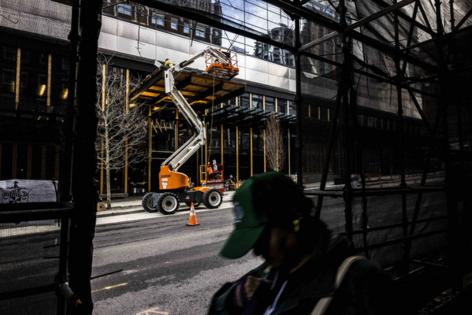ICE fears contribute to construction labor shortage in WA
Published in Business News
Washington’s construction industry, still struggling with high building costs and slow market dynamics, is now facing labor shortages as the federal government ramps up immigration enforcement, according to a survey released Thursday by the Associated General Contractors of America.
The shortages appear to be counterintuitive as the market slowdown has led to job losses across the industry. But some surveyed contractors report a skill issue — that they are having trouble finding qualified workers.
“Construction employment has stalled or retreated in many areas for a variety of reasons,” Ken Simonson, AGC chief economist, said in a statement Wednesday. “But contractors report they would hire more people if only they could find more qualified and willing workers and (if) tougher immigration enforcement wasn’t disrupting labor supplies.”
Washington has experienced some of the highest construction job loss levels in the country, according to AGC analysis.
In July, the state had 8,200 fewer construction jobs, a 3.6% loss of total jobs reported a year earlier in July, according to AGC and federal data.
The Seattle-Tacoma-Bellevue area made up nearly half of those job losses, according to AGC.
And yet, general contractor companies are reporting a scarcity of qualified candidates.
Out of 37 surveyed companies in Washington in July and August, 76% reported open salaried positions. Hourly craft workers are even more in demand, according to the survey, with 89% of companies having open positions. Crane and heavy equipment operators, surveyors and pipe fitters/welders are some of the most difficult positions to fill, according to the survey.
The surveyed companies blamed a lack of qualified candidates, new hires leaving shortly after starting, and potential employees lacking required credentials, such as a clean background check or a work permit.
‘Severely compromised’
There is an array of possible reasons for the shortage, experts say.
The construction industry is still reeling from losing a significant chunk of its workforce during the Great Recession — when building plummeted, said Anneliese Vance-Sherman, the chief labor economist for Washington State Employment Security Department.
“The talent pipeline was severely compromised,” she said.
A wave of retirements has also contributed to the gap.
“If you have a lot of retirements taking place and you’re looking for someone with the same skill set as the person who is retiring, that can be a really hard position to fill,” Vance-Sherman said.
Janelle Guthrie, vice president of communications for the Building Industry Association of Washington, said it’s difficult to find qualified candidates across the board.
“There (are) people who are interested in the trades, and then there are people who have taken the classes,” Guthrie said.
Many contractors are spending more on training and professional development, according to the survey. They’re increasing their online strategies to better connect with young applicants and engage with career-building programs, such as those that high schools and colleges offer.
Monty Anderson, executive secretary of the Seattle Building and Construction Trades Council, has a different perspective on the reported reasons behind the shortage.
He believes there isn’t a lack of qualified workers but a lack of companies willing to pay competitive wages.
“Sometimes, we get this idea that there’s no workforce,” he said. “Well, there’s no workforce if you’re going to pay the bare minimum and not provide any training or any benefits.”
Immigration fears
Construction companies are running into another problem: Their subcontractors’ workers aren’t showing up to work.
A quarter of Washington companies surveyed said their subcontractors lost workers in the last six months due to immigration enforcement actions.
But none of those companies reported job sites visited by immigration agents or their own workers failing to appear because of actual or rumored immigration actions.
It’s against federal law for companies to knowingly hire undocumented workers. Despite this, much of the housing construction industry has come to rely on immigrant labor.
Nationally, immigrants make up one in four workers in the construction industry, according to 2023 data from the National Association of Home Builders.
Tracking of undocumented labor in the construction industry is difficult. But the Migration Policy Institute, a nonpartisan think tank based in Washington, D.C., estimates that 21,000 undocumented immigrants work in Washington state’s construction industry.
In the AGC survey, Washington construction companies report they are most in need of carpenters and construction laborers, which require less formal education but make up some of the largest labor shortages nationwide. Immigrants make up a third of all carpenters and 42% of all construction laborers, according to NAHB.
There have been few reports of immigration agents raiding construction sites in Washington. However, a raid at a Bellingham roofing company where 37 employees were detained made national headlines in April.
Still, an immigration raid is a scenario Washington construction companies are preparing for, Guthrie said. BIAW has guidelines for what companies should do if immigration agents visit a jobsite.
No matter their documentation status, many immigrant workers are expressing fear over increased immigration enforcement, not just for themselves, but for their families, Anderson said.
He said he has come across undocumented construction workers in Seattle who are being paid in cash. Companies will hire undocumented workers, who often work for less, to cut down on their costs, he added.
“Some of these companies give more regard to the cost of concrete and sheetrock than they do to human beings,” he said.
©2025 The Seattle Times. Visit seattletimes.com. Distributed by Tribune Content Agency, LLC.












Comments